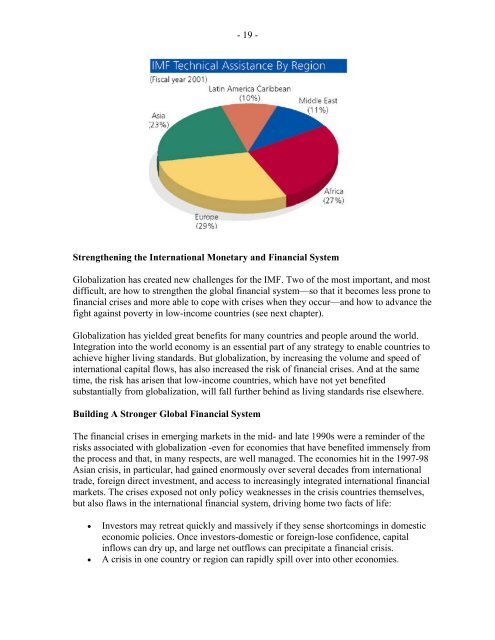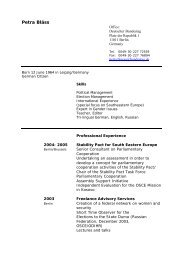What Is the International Monetary Fund? - the JVI eCampus!
What Is the International Monetary Fund? - the JVI eCampus!
What Is the International Monetary Fund? - the JVI eCampus!
You also want an ePaper? Increase the reach of your titles
YUMPU automatically turns print PDFs into web optimized ePapers that Google loves.
- 19 -<br />
Streng<strong>the</strong>ning <strong>the</strong> <strong>International</strong> <strong>Monetary</strong> and Financial System<br />
Globalization has created new challenges for <strong>the</strong> IMF. Two of <strong>the</strong> most important, and most<br />
difficult, are how to streng<strong>the</strong>n <strong>the</strong> global financial system—so that it becomes less prone to<br />
financial crises and more able to cope with crises when <strong>the</strong>y occur—and how to advance <strong>the</strong><br />
fight against poverty in low-income countries (see next chapter).<br />
Globalization has yielded great benefits for many countries and people around <strong>the</strong> world.<br />
Integration into <strong>the</strong> world economy is an essential part of any strategy to enable countries to<br />
achieve higher living standards. But globalization, by increasing <strong>the</strong> volume and speed of<br />
international capital flows, has also increased <strong>the</strong> risk of financial crises. And at <strong>the</strong> same<br />
time, <strong>the</strong> risk has arisen that low-income countries, which have not yet benefited<br />
substantially from globalization, will fall fur<strong>the</strong>r behind as living standards rise elsewhere.<br />
Building A Stronger Global Financial System<br />
The financial crises in emerging markets in <strong>the</strong> mid- and late 1990s were a reminder of <strong>the</strong><br />
risks associated with globalization -even for economies that have benefited immensely from<br />
<strong>the</strong> process and that, in many respects, are well managed. The economies hit in <strong>the</strong> 1997-98<br />
Asian crisis, in particular, had gained enormously over several decades from international<br />
trade, foreign direct investment, and access to increasingly integrated international financial<br />
markets. The crises exposed not only policy weaknesses in <strong>the</strong> crisis countries <strong>the</strong>mselves,<br />
but also flaws in <strong>the</strong> international financial system, driving home two facts of life:<br />
• Investors may retreat quickly and massively if <strong>the</strong>y sense shortcomings in domestic<br />
economic policies. Once investors-domestic or foreign-lose confidence, capital<br />
inflows can dry up, and large net outflows can precipitate a financial crisis.<br />
• A crisis in one country or region can rapidly spill over into o<strong>the</strong>r economies.



